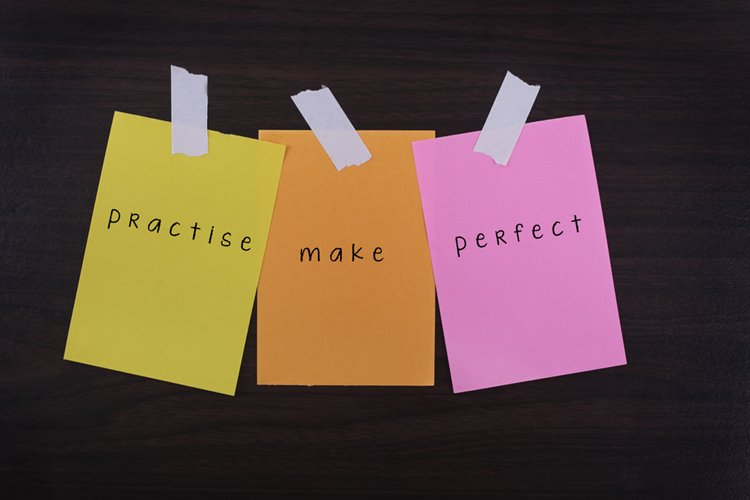Study smarter, not harder: How to retain more info in less time

There are few things less frustrating than sitting down to read 5 whole chapters on the fundamentals of business management – only to realise that you’ve forgotten about 60% of the stuff you’ve read come exam time.
For those who are unfamiliar with this phenomenon, congratulations – you’ve managed to avoid that sickly, sweaty mini-panic attack as you gloss over your paper in baffled wonder. For the rest of us, it’s nothing less of an unpleasant experience. Why is it that you can’t remember what you learned from that section on Javascript basics, that one time you sat down and read through your (very expensive) IT 101 textbook for two hours?
Turns out, many of us may just be studying the “wrong” way. While it may feel productive to spend a long chunk of your day buried in readings, our brains may not be retaining as much information or data as we think.
There’s this concept called the “Learning Pyramid” – one that was actually developed all the way back in the 1960’s by the NTL Institute in Bethel, Maine – that simply outlines the ways an individual learns best, from most to least effective.
According to this framework, the time spent trying to absorb stats, text, and graphs from just simply reading, listening to lectures, or going through audio-visual materials for hours on end are some of the least effective ways to retain information. To get your cranium ready for that big final test, we recommend you try out these other study tactics to retain more info instead:
Teach Someone (or at Least Pretend to)
Instead of keeping all the info you’ve gathered in notebook scribbles or in your short-term memory, try teaching what you’ve just learned to someone else.
According to the Learning Pyramid, you retain 90% of what you learn through explaining the same material to somebody else. It also puts what you’ve just studied to immediate use, and through teaching or implementation, you get to make mistakes. Once you allow yourself to make these errors, you’ll get to pick out where exactly where you lack in knowledge, and re-study or improve on those areas. The sooner you get to identify these errors, the sooner you get to correct them, levelling up your concentration.

If you don’t have anyone around who wants to listen to you ramble on about payroll systems and financial budgets, no worries – you can always read the information out loud to yourself, or perhaps even blogging them.
Study in Small Bursts
It may seem fruitful to go through your readings for hours at a time, but your ability to retain information actually diminishes around the 50-minute mark. According to experts from Louisiana State University’s Center for Academic Success, anything below 30 minutes of studying just won’t cut it, but anything over 50 minutes can be too much for the brain to take at a time.
This way, you can study shorter but more frequently, and reward yourself after each study period – giving your brain a well-deserved break after each session to recharge.
For those juggling different subjects at a time – you also can use this tactic to learn a different topic within each session. This keeps things more interesting, and you’ll get to cover more ground each day, albeit in small increments.
Additionally, spacing out your study in this way curbs your temptation to procrastinate. Instead of having the daunting task of reviewing your materials for a solid, 4-hour study session by the end of the week – you can whittle this down to a much less intimidating 30-50 minutes a day (or even every other day).
Retain More Info Through Sleeping
Sounds counter-productive? Research has shown that getting some shut-eye after study can aid in the retention of memories, as the regions of our brain related to memory-making and storage get to work during the sleeping process.
In an experiment conducted by German scientists, it was discovered that even a short nap played a significant part in an individual’s ability to retain information. Two groups were given a set of illustrated cards to memorise, then, after a 40-minute break, were made to learn a completely different set of cards.

While one group was asked to nap during the break, the other stayed awake. As you can probably guess, the results showed that the napping group managed to remember 85% of the cards, while the group that kept their eyes peeled only managed to remember 60%.
As mentioned in our previous post on “The Benefits of a Good Night’s Sleep On Your Studies”, the reason for this case is our brain’s procedure on “saving” memories. When a memory is initially processed, it takes place in our brain’s “hippocampus”, where it still has the potential to be easily forgotten. Sleeping, however, pushes this information into the "neocortex" – a more “permanent” storage area in the brain.
So, good news for the people that dread long hours of textbook-reading; it might be best for you to use some of that time to doze off, instead.
Skim Through the Text First
A quick and easy way to help you remember your stuff in a shorter timeframe is to skim through your reading material first, before diving into the details. Professor of neuroscience Bill Klemm mentions this in his article on how to effectively remember what you read; he explains that skimming your text beforehand allows you to get familiar with your topics, thus letting you to know what to expect before you dig into the specifics. Creating an overall sense for the document, he states, allows you to more easily “remember certain particulars.”
Klemm also mentions that there may be even be sections of your reading material that require no more than a simple skim. To still get the most out of the information given, however, he clarifies that a “proper” skimming would involve placing emphasis on the headers, visuals, graphs, diagrams, and keywords of a text, and should be slowed down during parts that may contribute to your reading purpose.
Practise What You’ve Learned
Taking the same concept as our first point – teaching what you’ve learned – putting your study into practice also does wonders for helping you remember all your valuable information. Just like teaching, implementing what you’ve learned allows you to make all the mistakes you need to figure out the areas that need improvement. The great thing about materializing your knowledge, however, is that you get to see what you’ve learned in action rather than keeping it on paper.

For example, instead of keeping your HTML and CSS know-how all in your head, why not use what you’ve learned to try and create your own website? Really delving into your course teachings through practical application allows you to get even more familiar with the information given to you, and helps you learn how to use it rather than just regurgitate it.
Going back to our aforementioned “Learning Pyramid”, this study tactic allows learners to retain 75% of their material, rather than a mere 10% from just reading, or an even lesser 5% from just listening to a lecture.
Individuals study best through different ways, but lengthy, intense review sessions may be doing your study more harm than good. Try out our tactics for size – you may just double the stuff you remember by splitting your study time in half.
For more articles on how to level up your study techniques, be sure to check out more of our articles on studying and productivity here on SkillsTalk.


)
)

